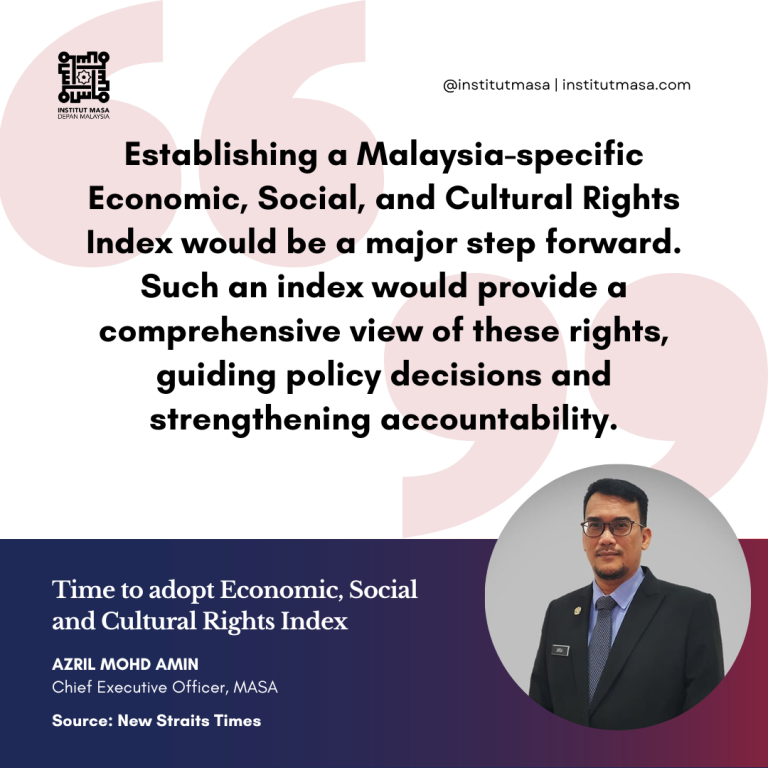By Azril Mohd Amin
AS Malaysia continues its journey toward becoming a fully developed nation, it is crucial that this progress benefits all citizens, ensuring fairness and inclusivity.
While discussions often focus on civil and political rights, the significance of economic, social and cultural rights (ESCR) cannot be overlooked.
These rights are vital for every Malaysian’s dignity and wellbeing, yet their protection remains underdeveloped, largely due to the lack of a structured framework for effective monitoring and evaluation.
Establishing a Malaysia-specific Economic, Social, and Cultural Rights Index would be a major step forward. Such an index would provide a comprehensive view of these rights, guiding policy decisions and strengthening accountability.
Globally, the International Covenant on Economic, Social and Cultural Rights (ICESCR) enshrines the protection of ESCR — a treaty Malaysia has yet to ratify.
The ICESCR commits states to recognising and upholding rights such as education, health, adequate housing, work and cultural participation, emphasising the principle of progressive realisation.
While Malaysia’s unique socio-political landscape has often been cited as a reason for caution in ratifying the ICESCR, these challenges should not deter us from taking proactive measures to protect and promote these rights within our own context.
Developing an ESCR Index would align with the spirit of the ICESCR, signalling Malaysia’s commitment to these essential rights, even without formal ratification.
Professor Paul Hunt, a former United Nations (UN) Special Rapporteur on the right to health, notes that without effective monitoring, there’s a real risk that economic, social and cultural rights will be neglected or even violated.
Norway’s Social and Cultural Rights Index and South Africa’s Socio-Economic Rights Monitoring Tool are prime examples.
Norway integrates ESCR into its broader human rights monitoring framework, focusing on equitable access to education, healthcare and housing.
South Africa’s tool evaluates the state’s obligations in housing, healthcare, food, water and social security, providing a robust framework for assessing performance, particularly in addressing the needs of marginalised populations.
A Malaysian ESCR Index should reflect the country’s diverse socio-economic and cultural landscape.
Key areas include education, healthcare, housing, employment, social security and cultural rights, using carefully chosen indicators for a comprehensive evaluation.
To be effective, the ESCR Index must be regularly updated and monitored by an independent body, possibly through collaboration between government agencies, civil society and international experts.
Publicly available reports and data will ensure transparency and enable continuous improvement.
A Malaysian ESCR Index offers a clearer understanding of the nation’s progress in fulfilling these essential rights and driving policy changes to ensure that all citizens benefit from Malaysia’s development.
As we aim for developed nation status, it’s imperative that our progress is measured not just by economic growth but by the wellbeing and dignity of all citizens.
Adoption of the index would provide a comprehensive measure of progress beyond traditional economic growths and indicators like the Gross Domestic Product.
Such holistic assessment of development would include many other aspects relating to health, education, housing and cultural participation, giving a fuller picture of societal wellbeing and development in this country.
In terms of policy guidance, by identifying strengths and weaknesses in various areas, the index can guide policymakers in crafting targeted strategies to address specific issues, ensuring that economic growth translates into real improvements in quality of life.
As for social equity, the index can help highlight disparities and inequities within the population. Addressing them can promote social cohesion and stability.
Adopting and tracking such an index will align Malaysia with international human rights standards and commitments, reflecting a commitment to respecting and promoting economic, social and cultural rights as part of human rights obligations.
Providing clear metrics on how well rights are being fulfilled will also help strengthen the government’s accountability in these areas.
Focusing on economic, social and cultural rights helps ensure that growth is sustainable and equitable, supporting the building of a resilient society where economic prosperity is shared broadly and cultural heritage is preserved.
By integrating economic, social and cultural dimensions into the evaluation of progress, we can better align our development strategies with human development goals, ensuring that all aspects of citizens’ lives are considered.
Overall, an ESCR Index could help Malaysia move towards a more inclusive and sustainable development model, addressing not only economic growth but also the quality of life and rights of all Malaysians.




